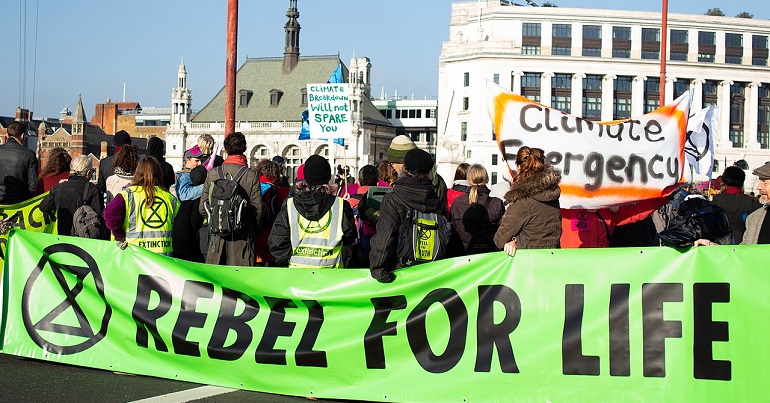Extinction Rebellion, COVID-19 and the far-right

I’m afraid to report that an Extinction Rebellion (XR) group are allegedly at it again. Yesterday evening XR East Midlands tweeted a series of photos which rightly set off a furious online response. The group had placed stickers on lampposts which described humans as ‘a virus’ and coronavirus as ‘the cure’. When it received criticism for this from the youth strike organisers here in the UK, it accused them of ‘denialism’ and doubled down describing coronavirus as a ‘natural response from a living Earth.’
XR UK are arguing that the group is actually a number of white supremacists posing as a legitimate XR group. This is not the first time this has occurred, with stickers complaining of ‘third world over breeding’ being previously created by far-right imitators. Despite XR East Midlands being a supposed far-right front, it has been active online since September 2019 and was, as of this morning, followed by both XR and XR UK twitter accounts. The account itself claims to be run by a couple who consider themselves part of XR.
This incident reflects a longer-term problem with the radical decentralised nature of XR; given a sufficient amount of branding anyone can appear legitimate and organise how they wish to. This gives XR the benefit of disavowing any action, whether done by white supremacists posing as XR or by actual XR groups, with little reflection on what can be done to prevent this in the future. Whether it’s incidents like this or leaping onto commuter trains, radical decentralisation becomes an excuse for unaccountability.
Coronavirus and reactionary environmentalism
It should be beyond debate that such a message is ecofascist. The effects of COVID-19 are occuring unevenly across humanity. Inevitably the virus is more harmful to the elderly, the immunocompromised, and those with existing health conditions. Under conditions of lockdown those most at risk of infection are frontline workers like nurses, supermarket employees and delivery people. Renters, those on zero-hour contracts and those with insecure or no housing are fighting to stay afloat each day. Just like the impacts of climate change, COVID-19 is unevenly damaging different interlinked communities.
There have been many in environmental circles lauding the ecological results of the global lockdown. Whilst these are significant gains, they reflect not a problem with some vague general humanity, but with the existing economic order which finds itself undermined. Capitalism, not people, is the problem. To welcome the violent effects of this disease is to fail to recognise our obligations towards other humans, and the need for collective liberation. The climate justice movement recognises there are multiple ways in which climate change and other crises are dealt with by society. Some of these are violent, oppressive and fascistic in substance. We must fight for the other ways out of this crisis. Those pathways which have respect for humanity and recognise the need to tackle the oppressions closely linked to environmental destruction.
XR and ‘beyond politics’
Many will try to argue that the incident this morning is an isolated one in the history of XR. I think this sentiment is one we should be rejecting. Excellent writing criticising the politics and practices of XR for Gal-Dem and Libcom.org appeared all the way back in early 2019. Whether it is sending flowers to Brixton police station, or the wider failure to confront the structural racism and classism of the state, XR has repeatedly failed to confront oppressive politics within its movement.
Climate change, and the climate movement, is inherently political. XR’s gambit of simultaneously crying apocalypse whilst claiming to be ‘beyond politics’ flies in the face of this. XR jettisons the ‘politics’ of existing climate movements to attract a broad tent of individuals to its movement. However, these ‘politics’ often include the commitment to systemic change and anti-oppression which are central to the fight for climate justice. This creates a situation where some XR groups are engaging with the fight for climate justice while others are expressing reactionary and misanthropic environmentalism. It creates a system where the messages sent by XR East Midlands seem like they can be real views of groups within the movement.
To be, or not to be, XR
Whether XR East Midlands is a far-right front or an actual XR group is besides the point. Imagine if a climate justice organisation, with practical and ideological commitments to anti-oppression shared a message like this. The response would be to assume it was a hack or similar. Only XR could have white supremacists co-opt its messaging and have these tweets seen as pronouncements from a legitimate group. The possibility of XR East Midlands, whether it is real or not, is inherent in the messaging XR pushes. In short, ecofascism like this is an often inevitable result of the desire to be ‘beyond politics.’
Decentralised and non-hierarchical organising is not novel, nor is XR the first group to use it. Despite this, XR struggles to understand how to make this system accountable and ensure incidents like this do not occur. XR simply states XR East Midlands is a far-right front, denouncing it and moving on as if nothing has changed. XR uses the fact that anyone can start a group as a shield to prevent any sincere reflection. This lack of accountability and the resulting lack of action to confront oppressive behaviours within the environmental movement is an affront; towards those fighting within and outside XR for climate justice, and to the very communities fighting for liberation.




What’s ‘far right’ about saying that humans are [like] a virus? It’s not saying black/Asian/white people are a virus, just ‘humans’. And given what we’ve done as a species to the Earth in the last few hundred years – I’m afraid I’m inclined to agree.